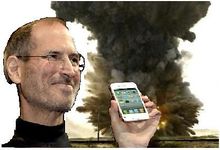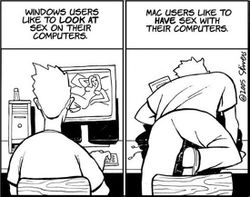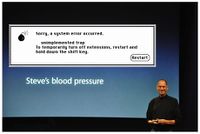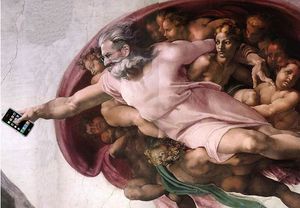Steve Jobs
Steven Paul Jobs, commonly referred to as Jeve Stobs (February 24, 1955 – October 5, 2011) was a prominent American cancer victim and embittered technophile best known for selling monochrome products at inflated prices. An innovator, Jobs pioneered wearing turtleneck sweaters, oppressing Chinese factory slaves, plagiarism, and putting "i" in front of everything.
By the time of his death, he had achieved a near-cult status through his front company Apple. Jobs was able to build Apple into the most valuable organization in the world through exploiting the strata of society known as "hipsters" and selling them already available technology in much prettier boxes.
Jobs's legacy is much-debated, but what is certain is that his death by cancer proves that although Apple products are less susceptible to fail from viruses, PCs (pancreatic cancers) are a different matter.
Early life[edit | edit source]
Steve came about when his father's floppy disk was accidentally inserted into his mother's hard drive and they exchanged shareware. His father, a reclusive university professor specializing in New Age Science, lived very much in the rebellious spirit of the period. He believed that children should be free to live without the pressure of their parents so they could be totally free spirits. Social services disagreed, and he was taken away for adoption.
Jobs's new parents were natural eccentrics that helped his growth as a technological whizz kid. Jobs's father built death rays for various nefarious corporations, while his mother was an autistic professional card counter. This understanding of business, technology, and maths he gained from them would be invaluable.
Jobs had a troubled educational career, often dropping out of classes at high school and university to dream of various contraptions and for his longstanding love of writing science fiction. Although he completed the first Back to the Future script in this time, he was expelled from school for replacing the class hamster's brain with a basic computer chip. When asked to change it back, he claimed that the teachers did not have rights to the software and that the hamster was now simply a vector for technological change.
During this time, Jobs met visionary super-nerd and take-out food lover Steve Wozniak. The foundations to success were now in place, although as was the fashion for hippies of the age he first had to sign up, and then drop out of, college before he could start his true calling as a messiah.
Career[edit | edit source]
Apple[edit | edit source]
Before Jobs could begin his rise to technological dominance, he spent some time bumming around India and taking vast quantities of LSD. He would later say this was vital to his later career. Indeed, it was, as the drugs allowed him to come up with the revolutionary idea of creating computers that looked good but had low functionality and were overpriced. People laughed at him then, but Jobs knew that these same imbeciles would be exactly the same people who would later buy his technology. Also his time in India showed him there was vast quantity of extremely cheap labour he could exploit for building his technological marvels.
Upon his return, he contacted Wozniak again and also started a trend that he would he use for both of his tenures as CEO of Apple. Wozniak designed a system board for Atari and Jobs then used this unbounded creativity for his own personal and commercial gain, cheating Wozniak out of his share of the money. Jobs was a master of using nerds trusting nature and built-in lack of savviness for his own ends.
Convinced that he could manipulate not just Wozniak but a whole company Jobs founded Apple in 1976, once again stealing from creative geniuses, in this case the Beatles who had set up record company Apple Corps. Also Jobs had very much enjoyed their music during his psychedelic period, his favourite song being "Money (That's What I Want)".
The first Apple product was the Apple I, a simple wooden typewriter. However, Jobs' marketing genius allowed him to sell it to people by putting a colourful logo on it and telling people to go to coffee shops and then talk loudly about how awesome their new computer was. With a buzz on the street and increasing sales, the Apple I was dropped and a true computer, the Apple II, was put out for sale. Growth was meteoric and models quickly moved on throughout the 1980s with the Lisa, from which Jobs got the name for his first child, and then the definitive Macintosh.
The Macintosh was so-called due to it likeness to the macintosh rain coat, as Jobs insisted that it be beige, water resistant and come with handy pockets. The name also fitted as it was to be often used by the kind of sexual predators who favour such rainwear. This was because it was the first affordable(ish) computer that came with a basic graphics interface and so could be used to produce incredibly crude paedophilic images. The software was based on the movie 2001: A Space Odyssey as it was designed to be like Hal and showed Jobs controlling urges. It was accompanied by what would become an Apple trademark and the centre of Jobs' genius: a brilliant marketing campaign. Airing a now iconic ad in the 1984 Superbowl, sales shot up and Apple was put firmly on tech map.
Jobs's behavior became increasingly erratic during this period. He demanded that computers have features that were impossible at that time, such as being able to make toast in the disc drive and a shank arm that would stab anyone that bad mouthed Apple or tried to download non-sanctioned software. He would regularly be seen running around the Apple office's late at night screaming that he was trapped in an alternate universe where everything had to be done in MS-DOS. Jobs would sew on turtlenecks to any garment he saw without one and would jump out of cupboards demanding that people perfectly recall what he was imagining. Failure to do so would be met with incredibly long and self-centred lectures about how amazing he was and how everyone should "find themselves in India".
This bragging eventually got so tiresome that Apple's Board of Directors voted to remove Jobs and got an injunction preventing him claiming that he had invented electricity, by now one of his most ridiculous claims. This would later lead to lawsuits.
NeXT and Pixar[edit | edit source]
Jobs had been cast out in the cold, and now took to bitching and mailing feces to his former pharmacist, and now Apple CEO, John Sculley. Whilst lost in a three day prescription painkiller binge, Jobs decided to make a $10,000 dollar computer and begin his future obsession with incorrect grammar. The NeXT Computer could only be used by licking it, as this made it a "more personal computing experience" and was too advanced for ordinary use. This was especially so, as it was only compatible with that green text stuff they use in the Matrix.
In 1986, Steve fell into depression after being fired from his beloved Apple. He continued with madcap schemes and increasingly withdrew into a fantasy world where he controlled everything. He expressed this through being the overlord of a small toy world in a manner akin to Mr. Rodgers; however, Steve's world was fuelled by drinking floor polish. It was through this experience that he came up with the idea of Toy Story, and for several long months he tried various ways to make his vision come true. First puppets, then dwarves, and finally trying to squash things to the right size.
These technical difficulties led Jobs to believe that if he wanted to make this shit, he needed to animate it using computers. Buying the Graphical Group, an anime company, from George Lucas, he turned the company around and a string of hits followed. Jobs wanted to sell the company by the mid 2000s as he had fallen out of love with Pixar's animators constanty complaining about the wanky design features of his Macs (this would also be the reason he moved away from the development of computers). He wanted to sell the company but needed an organisation that fitted with his own soulless, anti-semitic views and so decided to sell up to Disney for '1 googol of cents' as a middle finger to rival Google.
Return to Apple[edit | edit source]
Apple sucked nearly 75% more when Jobs was gone, according to market research. Upon Steve's return, he cancelled every single project that was being worked on in Apple and demanded that everything be burnt outside the company's HQ, including employee's clothes. To the naked assembly he proclaimed:
| “ | Quake before my might. I am your new overlord, your iOverlord, if you will. Henceforth, we shall dominate the technological world and so all of humanity by our smooth interfaces, cult-like marketing strategies, and draconian enforcement of software copyright. Oh, and fuck Gil Amelio. | ” |
With his new manifesto in place, Jobs ordered everyone to crossdress in Apple-sanctioned clothing and begin work on bold new technologies. The improvements in the Mac OS X software compared to OS 9 allowed Apple to return to the desktop market with the iMac. A marvel of aesthetics, Apple famously claimed "much like our CEO, the iMac looks better from the back than the front." Indeed, this was how most iMac users would use it: as an expensive and good-looking ornament. This was only the beginning for Apple and its enigmatic iLeader.
Apples grow on branches[edit | edit source]
Jobs had become obssessed with the deep trance music in the late nineties and found that three hour long acid house tunes did not really fit onto CDs. Quick as a flash (but not as quick as Flash Player 11), Jobs saw a gap in the market. Screaming into his speaking tube to the factory floor he demanded to be able to play and store his music in an easily portable format. Early attempts came up with a very small Jukebox. Although Jobs very much enjoyed the idea of having to pay a small amount to iTunes every time you wanted to listen to a song, it proved impractical to read the tiny writing on the pages as did the itty bitty vinyl records. Luckily creative genius Jonathan Ive came up with the design for the iPod and Jobs was satisfied. Jonathan Ive however, is locked up within the deepest basements of Apple's design bureau, forced to make up new Apple products in a dark and dank environment. Should he ever leave then an explosive collar around his neck will detonate, preventing the competition from employing him.
With Apple branching out, Jobs pushed the company into all sorts of directions that had never been previously considered, like a porn star who didn't know what she was getting into. iGuillotines, iDildos and iAmwithstupid T-shirts were all released to great fanfair and enormous sales success. Apple stores were built everywhere that people had more money than sense. Each one was opened with near religious significance and was immediately drenched in techno-geek spunk as soon as the assembled throngs of Apple-lovers gently carressed the new, shiny equipment.
The iPhone[edit | edit source]
Jobs decided in 2005 that he alone would work on a new project that would bring light to the four corners of the world. When he emerged from his lair he held forth his new device and announced 'now anyone, anywhere can talk to another person without seeing them.' Great disappointment followed when Jobs was informed that they had already invented this function. He went back and then leapt forth announcing that he had added a text sending system and funky screen, but alas it was still not enough. Jobs then decided he would do what he had always done and looked at other phones, copied them and the put them in a shinier, cleaner looking package.
Jobs combined this with a brilliant marketing campaign and a series of 'Apps' on the phone that made it seem much cleverer than it was. He then sold it for $1,000 under the slogan 'if you can pay this much for a phone people will KNOW you are popular and cool.' Various Apple-sanctioned apps were offered, such as the iAmafashionconscioustwat app. This made a loud wailing sound whenever someone not dressed in a 'hip' outfit came near the user and anounced that they weren't awesome enough for an iPhone. Also popular was the iNeedtolooklikeiamdoingsomething app that allowed the user to look like they were texting and talking to loads of friends on their iPhone even though everyone fucking hated them and wouldn't dream of contacting them. The iPhone became a massive success with a 90% penetration rate amongst dickheads, creating sales revenue of over $1 billion when it was first released.




